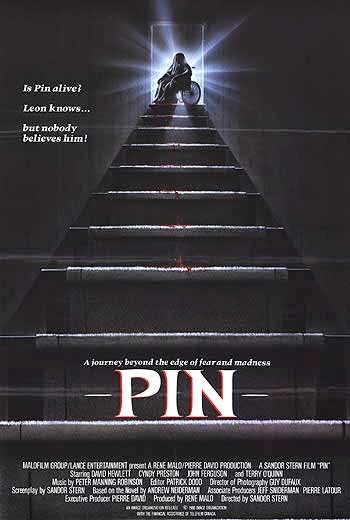
There are three things which can turn a movie from good to great: a unique storyline, wonderful usage of location shooting, and plenty of female pubic hair.
Breaking Point (1975-Sweden) has all three of these ingredients. Directed by Bo Arne Vibenius, who also directed the more well-known, Thriller: a Cruel Picture, Breaking Point tells the story of an office worker, played by Andreas Bellis—in this film his name is given in the credits as Anton Rothschild, in Sweden who, in the first five minutes of the film, kills a woman. Why we do not know. After that scene, we find that this man has what appears to be a dull job at an office where one of his female co-workers flirts with him by unbuttoning her blouse right in front of his desk. That never happens to me.
At some point during his work day, he walks down to the city subway and sees a beautiful young woman, played by Swedish actress/model Barbara Scott. He follows her to her house and proceeds to ask her to strip. “Strip you,” he says to her. She does. They have consentual sex and you realize why the Swedish title of this film is “Pornografik Thriller.” Yep, it has erections, 1970’s full nudal frontity…..not bad really. This kind of work break is much more fun than sitting in a boring breakroom eating a candy bar.
Earlier in the film, we learn that, because the city has become ravished with crime against women, the government is giving the population vouchers for free handguns. We learn this from a cool tv report that Rothschild’s character and his fellow office workers are watching. You take your voucher to a gun shop and you get your free gun. Of course, the crime that sets this government handgun program in motion is the one committed at the beginning of the film by the protagonist played by Mr. Rothschild.
After his daliance with the subway woman, he goes to a gun shop to claim his government issued handgun. He also has encounters of a sexual nature with two more women---one of which lives outside the city so he rents a car to go see her. This is where the wonderful usage of location shooting comes in. I would love to see this film either in a theater or on a remastered dvd version. Many scenes in this film where filmed in the Swedish countryside. The opportunity to see mid-70’s Swedish city life and the Swedish countryside in the same film was a treat.
Also occurring in the Swedish countryside is the most memorable, but not the best, sex scene in the film. It involves the man’s rental car, a very forward woman, and a gear shift. “Not the best one?,”you ask. Well, the gear shift does make it a strong second place.
I strongly recommend this film as it creates a fantastic sense of insecurity. I wondered throughout the film, “What will this guy do next?” It is not predictable at all. I love that.
I am sure that a lot of people would find the film offensive and be put off by our lead characters’ exploits as the film follows him through his, mostly sexual, dalliances. In between his interesting sexual encounters he takes time, while at home, to masturbate into a coffee cup, take this cup to work with him, and serve coffee in it to the woman who had unbuttoned her shirt in front of his desk—ok, this has to make you want to seek out this film. I was not sure why he did this, however, I was just fine with not understanding his every action during the course of the film. Vibenius seems to be saying to the audience that the lead character’s actions will be strange, but enjoy it for what it is. He is not supposed to be a great guy. It is a wonderful acheivement in simplicity and confrontationalism without being confrontational. It asks the audience to watch what this man is doing but it does not tell the audience what they should be feeling about him or his actions. It is definitely not for the easily offended, however, for those who seek out films that are non-mainstream and disturbing, Breaking Point will do it’s due dilligence in being both disturbing and entertaining.





















































































